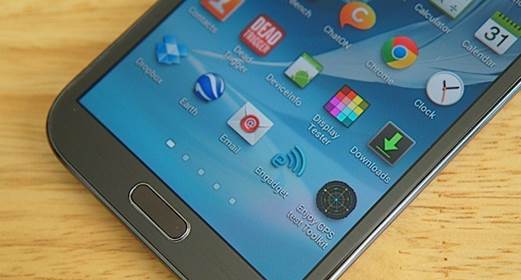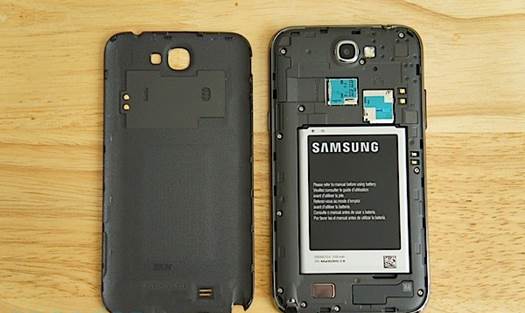Hardware
In case you didn’t have any chance to read
our in-depth review about Samsung Galaxy Note II international version, it is
clearly worth reading – but we will be pleased viewing some smartphone hardware
here. We will talk about several differences between N7100 and T-Mobile models
later, but now we are pleased to say two phones are nearly identical with some
changes for service providers.

Two
phones are nearly identical with some changes for service providers
If you think the source Note’s size is
distinguishable enough for casual smartphone users, Note II will ensure that
idea. Whether you like the 5.5in frame or hate it, there’s little space for any
neutral area here. However, it at least brings you comfort in palm, thanks to
the fact that the phone is slimmer than its predecessor (80.5mm vs. 83mm). It
also accepted the similar quartz-like design appearing on Galaxy S III, making
Note II thinner (9.4mm vs. 9.7mm) and helping it feel less uncomfortable in
palm than the source version which used a more regularly-shaped GS2 design.
As a result of the slimmer and nicer frame,
one-hand using Note II is easy as our medium-sized fingers can cover all areas
of the screen. It is still a bit stretching, meaning that the hand would thank
you for extra practice, but Samsung will reduce the worry a bit by introducing
features helping you to realize that you can’t use two hands at the same time.
For instance, keyboard and dial-pad onscreen can be pushed into sides for
easier operation when one hand is available.
Size also leads to another potential
concern: falling out. Bigger phones find difficulties staying firmly in palm,
hence being afraid that something might happen in case it slips out of your
hand is apparent. While the drama may happen to most of devices falling down to
a hard surface in a proper angle, initial tests seemly shows that this is not a
serious problem like in previous models of Samsung. With chrome-plated hinges
and the polycarbonate back lid, Note II offers a sturdier structure than your
typical device.

The
phone has HD Super AMOLED 5.5in with 1280x720pixel resolution and 267ppi
density
Looking at T-Mobile Note II, you won’t see
any change in screen’s appearance in comparison with the international version.
Like the foreign copy, the phone has HD Super AMOLED 5.5in with 1,280x720pixel
resolution and 267ppi density. On paper, it is a bit lower than the source
Note, which stuffed more pixels into a smaller space (1,280x800), but the
result is quite better. We will talk in detail in N7100 review, but this is a
summary: the old HD Super AMOLED using PenTile matrix while Samsung’s newest
attempts in providing a so-so upgrade for the RGB non-stripe layout. This is an
interesting compromise between RGBG and RGB, and it luckily leads to a better
experience. Assuming that we are doubtful whether casual users will realize the
difference, but when looking sides closely, we can see more pixels on the old
device. Shades appear darker in the second-generation model and colors are a
bit saturated. Viewing angle on the new Note is also ideal for movie watching
but it is not different, compared with the source model. With brightness
adjusted to over 75%, reading in daylight is possible, without resulting any
difficulty for our eyes.
Above the screen is a RGB LED status light,
macro sensor and 1.9MP camera. Below, you will see the physical Home button surrounded
by the left menu button and the right back arrow. Moving to sides, there’s
volume rocker in the left, power/standby button in the right and micro/headphone
jack on top. The bottom is for micro-USB/MHL contact, main micro and S Pen
slot.

The
phone’s back is the only place mentioning the service provider
Basically, the phone’s back is the only
place mentioning the service provider; T-Mobile’s logo lies outstandingly under
the 8MP camera and LED flash, with loudspeaker and “Galaxy Note II” texts
printed in large size (it is different from N7100 which has only one Samsung
logo above). Opening the back lid reveals a removable 3100mAh battery with
microSDXC and micro-SIM slots, as well as contacts for NFC and wireless
charging.
T-Mobile’s Note II, also called T889, is
the only version in the US to have no LTE (because of obvious reasons above) and
added by the standard AWS radio and DC-HSPA+ 42Mbps. Wi-Fi Calling, the feature
letting you not worry about indoor or outdoor signal strength, is also included
here. Despite rumors (and even T-Mobile’s official website) claiming this
special Note II is equipped with Qualcomm CPU, we confirm that it is actually a
similar Exynos 4412 sharing 1.6GHz clock rate.
According to T889’s apps, the device
includes support for LTE 4 (AWS) and 17 bands, though this special radio system
is now locked on T-Mobile. We hope AWS and LTE bands will be activated right
when the service provider is ready to head with the next technology, but we
haven’t heard any official statement from Magenta about this. Regardless things
that may happen, we won’t give it to Android coders to take advantage of this.
We would like to show you the following technical
specs detailing what you can expect to find – and enjoy – on T-Mobile Note II.
Galaxy
Note II SGH-T889
·
Dimension: 5.95x3.16x0.37 inches
(151.1x80.5x9.4mm)
·
Weight: 6.35 ounces (180g)
·
Screen size: 5.5 inches
·
Resolution: 1,280x720 pixel (267ppi)
·
Screen type: HD Super AMOLED (BGR)
·
Battery: 3,100mAh
·
Internal storage: 16GB (at first release)
·
External storage: Micro-SDXC (max. 64GB)
·
Rear camera: 8MP
·
Front camera: 1.9MP
·
Video recording: 1,080p
·
NFC: Yes
·
Wi-Fi: dual-band 802.11 a/b/g/n 2.4GHz/5GHz
·
Radio: DC-HSPA+ (42Mbps)/UMTS:
850/AWS/1900/2100; GSM/EDGE; inactivated LTE
·
Bluetooth: 4.0 LE (with Apt-X)
·
SoC: quad-core Exynos 1.6GHz
·
RAM: 2GB
·
MHL: Yes, requiring Samsung adapter
·
OS: Android 4.1 Jelly Bean
Galaxy
Note II N7100
·
Dimension: 5.95x3.16x0.37 inches
(151.1x80.5x9.4mm)
·
Weight: 6.35 ounces (180g)
·
Screen size: 5.5 inches
·
Resolution: 1,280x720 pixel (267ppi)
·
Screen type: HD Super AMOLED (BGR)
·
Battery: 3,100mAh
·
Internal storage: 16/32/64GB
·
External storage: Micro-SDXC (max. 64GB)
·
Rear camera: 8MP
·
Front camera: 1.9MP
·
Video recording: 1,080p
·
NFC: Yes
·
Wi-Fi: dual-band 802.11 a/b/g/n 2.4GHz/5GHz
·
Radio: DC-HSPA+ (42Mbps)/UMTS:
850/AWS/1900/2100; GSM/EDGE; LTE
·
Bluetooth: 4.0 LE (with Apt-X)
·
SoC: quad-core Exynos 1.6GHz
·
RAM: 2GB
·
MHL: Yes, requiring Samsung adapter
·
OS: Android 4.1 Jelly Bean